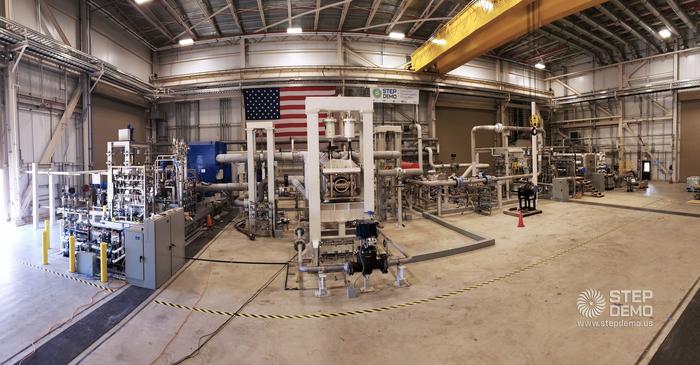SAN ANTONIO — May 29, 2024 —The Supercritical Transformational Electric Power (STEP) Demo pilot plant has generated electricity for the first time using supercritical carbon dioxide (sCO2) power cycles. The $169 million, 10-megawatt sCO2 facility at Southwest Research Institute (SwRI) in San Antonio is demonstrating next-generation power production technology in a project led by GTI Energy in collaboration with SwRI, GE Vernova, the U.S. Department of Energy/National Energy Technology Laboratory (U.S. DOE/NETL), and several industry participants.
“The impact of demonstrating that the sCO2 technology works cannot be overstated,” said SwRI Project Manager Dr. Jeff Moore. “I truly believe this project will change how we approach power generation in the near future.”
For the first time, the pilot plant’s turbine achieved its full speed of 27,000 RPM at an operating temperature of 260°C and generated a small amount of power. Over the next few weeks, the STEP team will slowly ramp up the operating temperature to 500°C and generate 5 megawatts (MWe) of power, enough to power 5,000 homes.
After completion of this first test configuration, the STEP Demo project will enter its final phase. The pilot plant will be reconfigured to boost the power plant’s efficiency and overall energy output. This modification requires the installation of new equipment, as well as a new commission and test phase that will continue into 2025 until the pilot plant is running at full power. At the end of its final phase, the pilot plant will produce 10 MWe hourly, enough to power 10,000 homes.
The STEP Demo pilot plant is one of the largest demonstration facilities in the world for sCO2 technology. Unlike conventional steam power plants, which use water as the thermal medium in power cycles, STEP uses high-temperature sCO2 to increase efficiency by as much as 10% due to its favorable thermodynamic properties. Carbon dioxide is nontoxic and nonflammable, and when CO2 is held above a critical temperature and pressure, it can act like a gas while having the density near that of a liquid.
The pilot plant’s sCO2 turbomachinery is approximately one-tenth the size of conventional power plant components, which shrinks the physical footprint and construction cost of any new facilities. Additionally, the sCO2 power cycles are compatible with many heat sources including concentrated solar power, industrial waste heat, geothermal power and advanced nuclear power plants.
SwRI, GTI Energy, and GE broke ground on the STEP Demo site in 2018. The facility achieved mechanical completion in October 2023, when major subsystems began commissioning.
For more information, visit https://www.swri.org/industry/advanced-power-systems/supercritical-transformational-electric-power-pilot-plant.

Credit: Southwest Research Institute
SAN ANTONIO — May 29, 2024 —The Supercritical Transformational Electric Power (STEP) Demo pilot plant has generated electricity for the first time using supercritical carbon dioxide (sCO2) power cycles. The $169 million, 10-megawatt sCO2 facility at Southwest Research Institute (SwRI) in San Antonio is demonstrating next-generation power production technology in a project led by GTI Energy in collaboration with SwRI, GE Vernova, the U.S. Department of Energy/National Energy Technology Laboratory (U.S. DOE/NETL), and several industry participants.
“The impact of demonstrating that the sCO2 technology works cannot be overstated,” said SwRI Project Manager Dr. Jeff Moore. “I truly believe this project will change how we approach power generation in the near future.”
For the first time, the pilot plant’s turbine achieved its full speed of 27,000 RPM at an operating temperature of 260°C and generated a small amount of power. Over the next few weeks, the STEP team will slowly ramp up the operating temperature to 500°C and generate 5 megawatts (MWe) of power, enough to power 5,000 homes.
After completion of this first test configuration, the STEP Demo project will enter its final phase. The pilot plant will be reconfigured to boost the power plant’s efficiency and overall energy output. This modification requires the installation of new equipment, as well as a new commission and test phase that will continue into 2025 until the pilot plant is running at full power. At the end of its final phase, the pilot plant will produce 10 MWe hourly, enough to power 10,000 homes.
The STEP Demo pilot plant is one of the largest demonstration facilities in the world for sCO2 technology. Unlike conventional steam power plants, which use water as the thermal medium in power cycles, STEP uses high-temperature sCO2 to increase efficiency by as much as 10% due to its favorable thermodynamic properties. Carbon dioxide is nontoxic and nonflammable, and when CO2 is held above a critical temperature and pressure, it can act like a gas while having the density near that of a liquid.
The pilot plant’s sCO2 turbomachinery is approximately one-tenth the size of conventional power plant components, which shrinks the physical footprint and construction cost of any new facilities. Additionally, the sCO2 power cycles are compatible with many heat sources including concentrated solar power, industrial waste heat, geothermal power and advanced nuclear power plants.
SwRI, GTI Energy, and GE broke ground on the STEP Demo site in 2018. The facility achieved mechanical completion in October 2023, when major subsystems began commissioning.
For more information, visit https://www.swri.org/industry/advanced-power-systems/supercritical-transformational-electric-power-pilot-plant.




